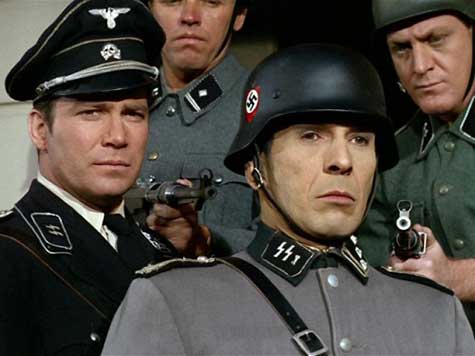Conservatives often talk about what they don’t like about Hollywood. That’s okay, but it’s not productive. Maybe it’s time we talked about what we do like? More to the point, let’s point out when Hollywood has gotten it right. And that brings me to the original “Star Trek” series.
I’m not saying the creators of “Star Trek” were conservatives; they weren’t. But liberalism has shifting values, and for a brief period at the end of the 1960s, liberalism temporarily overlapped with the values of classical liberalism, which is the foundation of modern conservatism. “Star Trek” benefited from this. In fact, I think you’ll be surprised how deeply conservative these shows are. So join us as we dissect the conservative nature of “Star Trek,” the original series, and sometimes compare it to the intensely liberal “Next Generation.” Let’s start today with Episode 50: “Patterns of Force.”
The Plot
This is “the Nazi episode.” The Enterprise is sent to the planet Ekos to investigate the disappearance of Federation historian John Gill. Gill, one of Kirk’s professors at Starfleet Academy, went to Ekos to observe their culture. As the Enterprise nears Ekos, the crew is shocked when a nuclear missile is fired at them. Beaming down in secret, they discover that the Ekosians have replicated Nazi Germany, right down to the uniforms, and the Ekosians are planning to exterminate their peaceful planetary neighbors, the Zeons. What’s worse, John Gill has made himself the Führer! Eventually, Kirk and Spock find a way to get to Gill. When they reach him, they discover he’s been drugged into a stupor and is little more than a literal figurehead. Deputy Führer Melakon is the real power.
Why It’s Conservative
On its surface, you might think a story about Nazis is left wing. After all, Hollywood wants you to believe the Nazis were a right-wing phenomenon equivalent to Libertarianism/ Conservatism. This is laughable, as the national socialist Nazis were everything the left claims to love. Yet, many people still ignorantly accept the idea the Nazis were rightists rather than leftists because that’s what they’ve been taught by leftist teachers. So it shouldn’t surprise us if a show about Nazis was meant as an attack on conservatives.
But “Patterns of Force” isn’t actually an anti-Nazi story. Rather, it’s a warning against the idea of the “benign” totalitarian government. To see this, we need only look at the episode’s payoff scene where Kirk questions Gill after McCoy counteracts the drugs given to Gill. Kirk angrily demands to know why Gill violated the Prime Directive (non-interference in alien worlds). Gill answers that the Ekosians were a divided people and Gill thought he could unify them using the Nazi model. Kirk then asks why Gill picked the Nazis, who were cruel and murderous. Gill (with an assist from Spock) explains that the Nazis, while ruthless, were highly efficient and highly organized. Gill believed he could recreate the good parts of Nazi Germany without the bad parts by being a benign dictator. Here’s the transcript:
KIRK: Gill. Gill, why did you abandon your mission? Why did you interfere with this culture?
GILL: Planet fragmented. Divided. Took lesson from Earth history.
KIRK: But why Nazi Germany? You studied history. You knew what the Nazis were.
GILL: Most efficient state Earth ever knew.
SPOCK: Quite true, Captain. That tiny country, beaten, bankrupt, defeated, rose in a few years to stand only one step away from global domination.
KIRK: But it was brutal, perverted, had to be destroyed at a terrible cost. Why that example?
SPOCK: Perhaps Gill felt that such a state, run benignly, could accomplish its efficiency without sadism.
KIRK: Why, Gill? Why?
GILL: Worked. At first it worked. Then Melakon began take over. Used the. Gave me the drug.
This is not a liberal message. To the contrary, it is a fundamentally conservative message.
Liberals desire powerful government. They believe that even totalitarian regimes can be good so long as they are run benignly. Indeed, you’ll often hear liberals suggest that we should suspend things like rule of law and free elections or give the state tremendous power so it can achieve some supposedly noble goal that can’t be achieved the legal way.
Conservatives, on the other hand, know you cannot give power to one person without taking away freedom from another, and they understand that what sounds like benign power to some is tyranny to others. They also understand that when too much power is given, tyranny will always follow. That’s the point of Lord Acton’s most famous quote: “Power tends to corrupt and absolute power corrupts absolutely.”
This difference in belief is a fundamental difference between conservative and liberal thinking.
And while it is true that many liberal stories involve people fighting against oppressive governments, it is important to note that they rarely (if ever) criticize the concentration of power itself. Instead, they merely attack those who would misuse the power, i.e. those who would use the power for purposes of which the liberals don’t approve; this is why oppressive governments in liberal stories are always police states, military dictatorships or theocracies. And in many cases, the resolution of the story involves the replacement of the evil government with a benign council of experts or bleeding hearts who will then use that same monolithic power “to help people.”
“Patterns of Force” rejects this as faulty logic. It warns that you cannot have a benign dictator. It warns the problem is the concentration of power itself, because the misuse of that power is inevitable. And no matter what the intentions may be for the creation of the state, the very concentration of that much power will attract someone who will misuse the power for evil.
And that makes this a fundamentally conservative message.
Next Time: “The Conscience of the King”


COMMENTS
Please let us know if you're having issues with commenting.